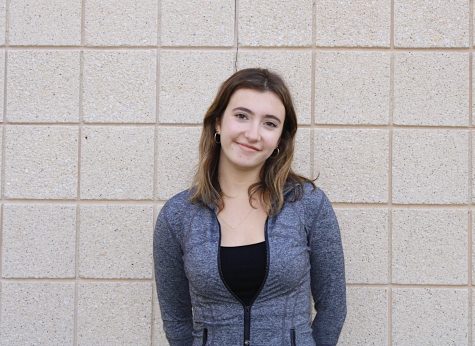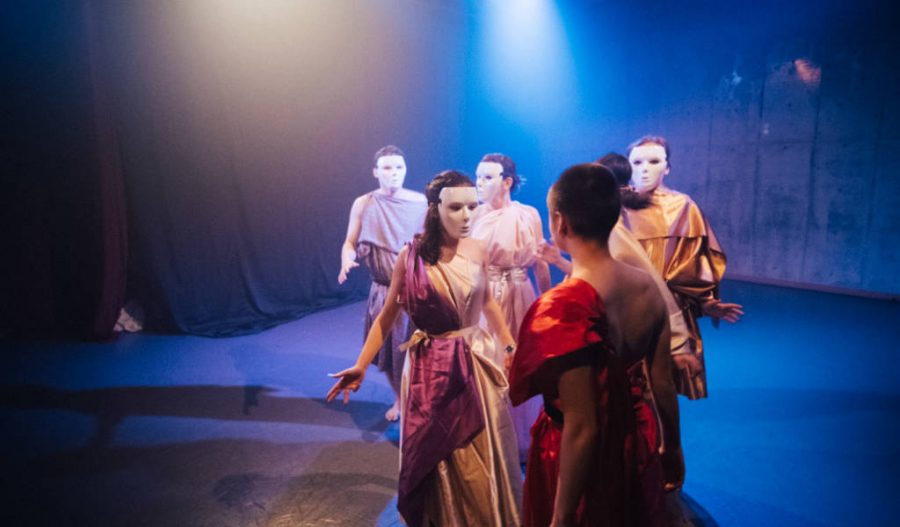Cappies Review: Upper Dublin’s Antigone Now
A production of Antigone Now
The Cappies is “a writing and awards program that trains high school theatre and journalism students to be expert writers, critical thinkers, and leaders.” The following is a review by Harriton senior and Lead Critic, Aiden Kaliner, on Upper Dublin High School’s production Antigone Now.
Thebes, a war-torn city, was destroyed by humanity’s everlasting conflict: individual morals versus the law. Though it may seem like a dystopian fantasy, Antigone Now at Upper Dublin underscores the timeliness of love, power, death, and grief.
Antigone Now, written by Melissa Cooper, is a post-war, modern adaptation of Sophocles’ ancient Greek tragedy, Antigone. Cooper’s plot follows the original: Antigone is conflicted by Creon’s law, decreeing that burying her disgraced brother is punishable by death. Her decision to disobey leads to Antigone’s demise. Though Cooper’s adaptation condenses the cast, updates the dialogue, and places the story in a contemporary setting, elements of the original myth are still incorporated, such as the age-old question: how do we determine what is right and wrong?
With the cast on stage the entire production, each actor captivated the audience’s attention. Specifically, the Chorus—consisting of Finn Anderson, Allison Chong, and Katie Horton— spoke synchronously and with ease. Their poetic dialogue and physicality allowed for an understandable and enjoyable narration of the mythical tale. Typically represented by one actor, the Chorus trio rhythmically portrayed multiple roles, changing minute intonations and details to reflect each.
Commanding the stage with a bold and powerful presence, Benjamin Brown as Creon masterfully utilized his rhetorical monologues to resemble a seemingly stoic politician. Brown’s portrayal in the final scene, after Antigone’s death, deserved tremendous applause. The flip in his acting, from harsh to contemplative, satisfied Creon’s character development perfectly. Earlier, his booming voice, filled with anger and disgust, provided the perfect opposition to Addy Deloffre’s defiant Antigone, whose facial expressions exemplified the tense and tragic mood.
Among the supporting roles, Petra Kolar (Ismene) was a loving, warm, and sensible contrast to Deloffre. Most notably, Kolar’s acting abilities shone in the melancholy. When Creon sentenced Antigone to death, Kolar evoked pity and fear, establishing a somberness permeating the rest of the production. A standout in the Chorus, Finn Anderson, invested himself in each role he portrayed. His transformations were nuanced yet quite noticeable, even adding comedic emphases into his dialogue to build character.
The UD Build + Paint Crew—in collaboration with props by Amelie Dunn, Seth Boas, and Carissa Shellenberger—effectively established the economic divide between the classes. By juxtaposing the outside world, littered with tattered fabrics and graffiti-covered sets, with Creon’s pristine home, they conveyed the destructive effect of imbalanced power dynamics. Additionally, the live-streamed newscast during the climax, led by Special Fx team Elyse Gonzales and Kiara Thompson, uniquely reimagined Antigone’s death sequence while staying true to Sophocles’ intentions of the action revolving around a public setting.
Beautifully modernizing the classic while paying homage to Sophocles, Upper Dublin’s Antigone Now was a production that would certainly delight the gods.

Ishika joined The Harriton Banner 4 years ago, and she has loved it ever since. First as a writer, then a section editor, and now tackling executive editor....

Anna, an IB senior, is excited for her fourth and final year at The Harriton Banner, returning as Executive Editor for the second year. She enjoys leading...


